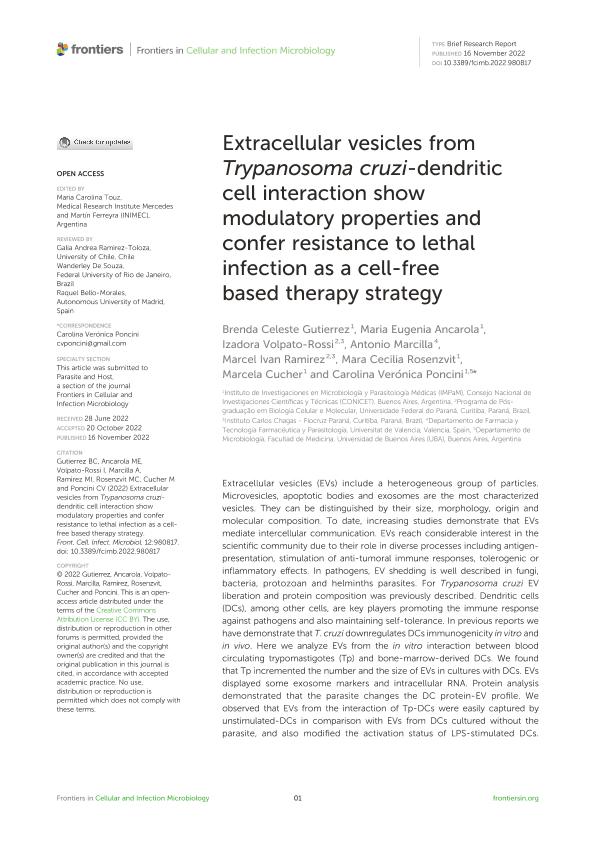Artículo
Extracellular vesicles from Trypanosoma cruzi-dendritic cell interaction show modulatory properties and confer resistance to lethal infection as a cell-free based therapy strategy
Gutierrez, Brenda Celeste; Ancarola, María Eugenia ; Volpato Rossi, Izadora; Marcilla, Antonio; Ramirez, Marcel Ivan; Rosenzvit, Mara Cecilia
; Volpato Rossi, Izadora; Marcilla, Antonio; Ramirez, Marcel Ivan; Rosenzvit, Mara Cecilia ; Cucher, Marcela Alejandra
; Cucher, Marcela Alejandra ; Poncini, Carolina Verónica
; Poncini, Carolina Verónica
 ; Volpato Rossi, Izadora; Marcilla, Antonio; Ramirez, Marcel Ivan; Rosenzvit, Mara Cecilia
; Volpato Rossi, Izadora; Marcilla, Antonio; Ramirez, Marcel Ivan; Rosenzvit, Mara Cecilia ; Cucher, Marcela Alejandra
; Cucher, Marcela Alejandra ; Poncini, Carolina Verónica
; Poncini, Carolina Verónica
Fecha de publicación:
11/2022
Editorial:
Frontiers Media
Revista:
Frontiers in Cellular and Infection Microbiology
ISSN:
2235-2988
Idioma:
Inglés
Tipo de recurso:
Artículo publicado
Clasificación temática:
Resumen
Extracellular vesicles (EVs) include a heterogeneous group of particles. Microvesicles, apoptotic bodies and exosomes are the most characterized vesicles. They can be distinguished by their size, morphology, origin and molecular composition. To date, increasing studies demonstrate that EVs mediate intercellular communication. EVs reach considerable interest in the scientific community due to their role in diverse processes including antigen-presentation, stimulation of anti-tumoral immune responses, tolerogenic or inflammatory effects. In pathogens, EV shedding is well described in fungi, bacteria, protozoan and helminths parasites. For Trypanosoma cruzi EV liberation and protein composition was previously described. Dendritic cells (DCs), among other cells, are key players promoting the immune response against pathogens and also maintaining self-tolerance. In previous reports we have demonstrate that T. cruzi downregulates DCs immunogenicity in vitro and in vivo. Here we analyze EVs from the in vitro interaction between blood circulating trypomastigotes (Tp) and bone-marrow-derived DCs. We found that Tp incremented the number and the size of EVs in cultures with DCs. EVs displayed some exosome markers and intracellular RNA. Protein analysis demonstrated that the parasite changes the DC protein-EV profile. We observed that EVs from the interaction of Tp-DCs were easily captured by unstimulated-DCs in comparison with EVs from DCs cultured without the parasite, and also modified the activation status of LPS-stimulated DCs. Noteworthy, we found protection in animals treated with EVs-DCs+Tp and challenged with T. cruzi lethal infection. Our goal is to go deep into the molecular characterization of EVs from the DCs-Tp interaction, in order to identify mediators for therapeutic purposes.
Archivos asociados
Licencia
Identificadores
Colecciones
Articulos (IMSATED)
Articulos de INSTITUTO MULTIDISCIPLINARIO DE SALUD, TECNOLOGIA Y DESARROLLO
Articulos de INSTITUTO MULTIDISCIPLINARIO DE SALUD, TECNOLOGIA Y DESARROLLO
Articulos(IMPAM)
Articulos de INSTITUTO DE INVESTIGACIONES EN MICROBIOLOGIA Y PARASITOLOGIA MEDICA
Articulos de INSTITUTO DE INVESTIGACIONES EN MICROBIOLOGIA Y PARASITOLOGIA MEDICA
Citación
Gutierrez, Brenda Celeste; Ancarola, María Eugenia; Volpato Rossi, Izadora; Marcilla, Antonio; Ramirez, Marcel Ivan; et al.; Extracellular vesicles from Trypanosoma cruzi-dendritic cell interaction show modulatory properties and confer resistance to lethal infection as a cell-free based therapy strategy; Frontiers Media; Frontiers in Cellular and Infection Microbiology; 12; 11-2022; 1-14
Compartir
Altmétricas



